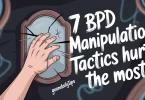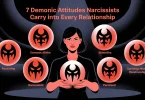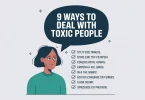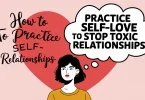Okay, we all know that if you don’t pay attention to certain red flags, they could destroy your relationships. It doesn’t matter how much you love each other; if you miss certain red flags, it causes conflict and puts strain on the whole relationship. So, let’s talk about my top five overlooked red flags.
Number five: different life stages.
Being at different life stages can easily set you up for eventual conflict and disconnection. And, of course, in the beginning, you feel like, “Well, we can make this work because it’s super fun and we both like each other a lot.” But, unfortunately, so often we’re trying to fit a square peg in a round hole, and eventually, it’s not going to be fun anymore. It’s going to be a whole bunch of unnecessary stress. Sometimes, you’re both just at a different stage of life.
They still want to party, while you feel like those days are behind you. They’re already divorced with a young kid, you still love the idea of traveling, and you don’t even really know where you want to live yet. I’m not saying it can’t work, I’m just saying don’t let these wonderful feelings of love blind us to the fact that we might be at completely different life stages.
In the beginning, nobody wants to ask these hard questions. Nobody wants to talk about what eventual conflicts we might have, or what could throw a wrench into this relationship. But countless times, we get in over our head, and then we resent them because they’re essentially stealing our independence now, or they’re being irresponsible, when really the warning signs were there all along. We just didn’t want to pay attention to them.
Number four: different values and goals.
This is a major issue in relationships. So many of us don’t even know what our values are. Whether you know it or not, you have core values, you have goals, you have a vision for what you feel like your life should look like, and what your relationships should look like. Get clear on those, because in the beginning, we’re terrified to actually talk about our needs and values.
But that’s when it matters most. If you have some past trauma, it feels like you’re not even allowed to have needs, right? It feels like talking about your non-negotiables would be stupid because, well, you want this person to like you. But that’s part of the problem. We should be more concerned with: does this person actually know the real us? We should be more concerned with: does this person align with my values, rather than: how can I make them like me more? Never forget that the biggest predictor of relationship success with someone else is how our relationship is with ourselves.
Do we know our own value and worth? How do we view ourselves? Are we willing to hold space? Are we practicing self-respect, self-compassion, and acceptance? Because how we love ourselves is a massive clue to how we will love someone else or what we will tolerate in someone else. If your faith is really important to you and you know that when you have a family, you envision your family going to church every Sunday, if that’s really important to you, you need to be talking to any partner you’re getting serious with about that.
If you know that honesty and transparency are core values for you, that’s something that you need to be discussing with them. If you know that pornography is considered cheating in your eyes, that’s something you need to let them know. If you know that you’re going to have separate bank accounts, if you know that living near your family and seeing them at least a few times a month is vital for you, then these values need to be expressed.
Don’t give any room for uncertainty or chance. This is where our boundaries come in. If you have a vision that says, “Even during a conflict, I still deserve respect and kindness,” and it doesn’t matter if I like you or not, I need to establish a boundary around anyone who crosses those lines. And remember, a boundary isn’t about controlling them. They can still talk however they want.
A boundary is about: what am I willing to accept and tolerate? I’m not willing to tolerate anyone yelling in my face during a conflict. They can continue to yell. I’m just planning on removing myself from the room because I’ve already established that boundary with them.
And remember, compatibility still matters. Yes, we like them. Yes, we want them to like us. But are we giving them a chance to accept the real us, or are we pretending to be laid back and chill and then later resenting them for not caring about something that was never clearly communicated? So, get clear on what your values and needs are.
Be bold and courageous enough to tell them so they have a chance to know and accept the real you. I promise you that if they end up leaving because of your honesty, yes, it hurts, but it doesn’t hurt as bad as divorce after years of unresolved conflict.
Number three: baggage and trauma.
The sad reality is, we all have some baggage from our past. We probably all have some trauma, but not all of us are willing to do the work and start on a healing journey. I think one of the worst things that we can do for our future peace and relational fulfillment is accidentally missing the red flags that someone is carrying baggage from their past into their relationship in the present. Someone smarter than me said, “If you don’t heal from those who cut you, you’ll bleed on those who didn’t.” And that can be true for your partner, and it can be true for you.
So, how does this manifest in our relationships? Well, obviously, unhealed trauma can come out in a lot of different ways, but let’s just go over some obvious and some overlooked red flags that I believe we have to address if we want a healthy, safe, mutually fulfilling relationship with anyone. The first is any type of abuse. We have to have a zero-tolerance policy for any abuse. Unfortunately, when you’re in an abusive situation, sometimes it’s very hard to see, and this content isn’t for people in those situations.
I would rather you be talking to a professional than getting any advice from a stranger on the internet, even though that stranger really cares about you. All I’ll say is this: you should never be called names. You shouldn’t be touched when you don’t want to be touched. You shouldn’t be demeaned or belittled. You are valuable and worthy of kindness and respect, baseline. There is no justification for someone verbally, emotionally, physically, financially, or psychologically abusing you. And sometimes, due to our past, we forget that it’s not okay, and it’s extremely dangerous. You deserve safety, consideration, and consistency always.
Number two is shame the belief that we’re worthless.
Brené Brown says that guilt says, “I did something bad,” but shame says, “I’m bad.” It makes sense if you grew up in homes where your caregivers were consistently hurtful with their words or actions. We come to believe that we must not be worthy of love, but that’s not true.
The problem is, this can severely hurt your relationships. No, you don’t have to fully love yourself to be in a healthy relationship, but how you view yourself matters, and a core belief that you’re no good can be disastrous to your relationships. It affects everything. So, if you have those thoughts, know that you’re not alone, but get help. Talk to a professional before you unintentionally sabotage a good, healthy relationship with someone you care about.
Alright, third is red flags around emotional unavailability or being emotionally immature. And obviously, we can all be immature at times, but here are just some of the red flags I could think of: someone who is disrespectful, aggressive, confrontational; someone who has to be right; someone who takes no accountability when they’re wrong or even when they hurt you unintentionally; someone who can’t apologize; someone who doesn’t see a need for validation or empathy; someone who has to escalate the fight because they can’t have a calm discussion with you; someone who is inconsiderate or self-centered; someone who tries to manipulate or control you.
These aren’t things that we should just brush off because, well, nobody’s perfect. These are red flags. There’s a reason the majority of marriages end in divorce or one partner being miserable even if they stay together. We have to do everything we can to set ourselves up for success. This isn’t about perfection. This is about direction toward humility, respect, and maturity.
Number four is trust issues.
Some people, because of their trauma, understandably have a lot of insecurity and trust issues. Sometimes that’s because they were hurt so badly in the past that, subconsciously, they’re terrified of truly getting close to someone because closeness only resulted in pain when they were a child. Now, we can have empathy for their past, we can have compassion for their pain or shame, but we still have to hold them accountable to any destructive coping mechanisms or toxic relationship behaviors.
We can understand how actual intimacy and vulnerability might terrify them, and we can also acknowledge that closeness, connection, and consideration are simply core values for us. We need those to be present in our relationship, and that’s okay if it’s not a priority for them, but it is for us. That doesn’t mean we’re abandoning them. It means we’re protecting ourselves from unhealthy or unsafe relationships.
Because the sad reality is, our childhood was a classroom, and you were learning things whether you wanted to or not. Some people were punished for trying to get close or connected to their caregivers, so now they’re either hypervigilant to stay connected to their partner, always needing constant reassurance that their partner still loves them, always testing their love, or picking fights with them just to make sure that they’re still worthy enough to fight for, which is also an example of immaturity and unavailability. It will eventually drive your partner crazy, and their insecure behavior actually becomes the cause of the distance and disconnection that they feared so much and were trying to prevent so aggressively.
They call this being anxiously attached, or you can have avoidant attachment, where you were neglected by the people who were supposed to love you the most. They weren’t there for you when you needed them. You didn’t feel like a priority to them, so it’s only natural that you come to believe that it’s not worth getting close to someone else because those people always hurt you. That’s why you run away when someone gets too close. That’s why you’re fiercely independent. That’s why you suppress your feelings and needs because it makes you very uncomfortable to think about yours or your partner’s. So you numb yourself with addictions, your job, superficial sex, food, or hobbies. But the point is, those aren’t compatible with long-term relationship success. It doesn’t mean that they are bad people. It just means that there’s work that needs to be done. There’s healing that needs to be started because when we don’t, we unintentionally sabotage even a healthy relationship because we or they aren’t capable of actual honesty, vulnerability, and closeness because of our fear.
And we all have a choice. If you aren’t interested…In mutual respect, intimacy, and intentionality in your relationships, then you have the option of staying single. No one is forcing you to enter into companionship with someone. I’m just warning you of what’s required if you do. What really helped me is answering the question: Why do I do the things I do? Figure out why you need them to validate your worth and value. Figure out why you pull away when they need closeness. Figure out why you defend or criticize. There are reasons for all of them, and most of them have to do with us trying to protect ourselves. But that protection isn’t serving us anymore. We need to let go of the fear, let go of the shame, and show up as our true selves. And yes, be respectful and kind, but also stop apologizing for your needs and desires. Not everyone is for you, but you won’t have to beg the right person to care about what you need to feel safe, valued, and loved.
Alright, number two: Love tanks. I personally love this topic. As I mentioned earlier, self-centeredness isn’t compatible with relationship success. I personally believe the best relationships are mutually selfless, but not from the standpoint of viewing yourself as unworthy of love and attention, but just the opposite. I know my worth. I know my value. I know what I deserve. I know what I need in relationships, and I can respectfully and vulnerably advocate for those needs. I care about how I’m being treated, but I also care about how you believe you’re being treated by me. You find me two people who are both intentional about checking in to make sure their partner feels valued, safe, loved, and prioritized, and is willing to do anything short of abandoning their boundaries to meet those needs. That’s a relationship that will thrive. That’s the equation for success. Let’s not make relationships more complicated than they are. You have to care about what fills your partner’s love tank. You have to care about what helps them to feel prioritized and valued. You have to have a desire to consistently execute those things, and you have to care about what leads them to feeling neglected or rejected, which keeps their tank empty.
Now, it’s not your sole job to make them happy, but if leaving the dishes in the sink and never washing them for days leaves them feeling neglected, like you’re putting that mutual chore all on them, then the solution is really easy: don’t do that anymore. You don’t need to make this into a fight and make this a giant thing about your independence and your autonomy, and you should have the freedom to wash the dishes whenever you want to. And if they’re going to make such a big deal out of nothing, then they can just wash them themselves, right? What you just did was admit that this isn’t about the dishes. This is about you feeling like you’re losing your independence. This is about you feeling called out. This is about your shame, your baggage from the past being triggered—your overly critical mom, or your emotionally distant dad who said that you would never amount to anything is rising back up in your nervous system. And you’re fighting that and making your partner the new enemy. But all they did was tell you that when you leave dishes in the sink, it makes them feel hurt and neglected, like you don’t value their time and that you’re entitled to them cleaning up after you.
But it’s our job to recognize when we’re triggered and when we’re filled with shame and guilt, and we’re starting to take it out on our partners. And to flip the same script around on you: you told them it would only take them 30 seconds to wash it instead of making such a big deal about nothing, and yet at the same time, you won’t take those 30 seconds to wash it and prevent this conflict in the first place. So let’s not start a double standard here. We both need to be on the same team. We both need to be a safe place for our partner to vulnerably and respectfully bring up a complaint, concern, or desire and not be punished for it. Now, of course, this doesn’t mean that they should be a completely negative person and always complaining, nor does it mean that they should criticize you or attack you with their words, but it also shouldn’t mean that they can’t feel safe to bring up an issue because you throw it back in their face, blow up, shut down, invalidate them, mock them, get defensive, or dismiss their feelings entirely. Because both of those things hurt relationships.
But back to our point: What fills their love tank? Is it appreciation? Is it time together? Is it one-on-one time where you put your phones down and you just talk? Is it when you write those little sticky notes to her in her mirror in the morning? Is it when he feels sexually desired by you? Is it when you flirt with him? Is it when he feels respected by you, when you defer to him and trust his judgment? Is it when you prioritize emotional connection and actual intimacy with her, where you ask her questions about her day, her stress, and what’s on her heart?
When you touch her and kiss her and don’t push for the bedroom? Is it when you check in with her to make sure she doesn’t feel overwhelmed? When you take on mutual chores without having to be asked because you love her and you can tell that she’s taking on too much? Ask them. Ask them to be specific. Ask them what behaviors cause them to fall in love with you in the first place. Ask them what you could do this week to fill their love tank and then do it. That’s what builds trust: consistency, filling our partner’s emotional love banks.
Because I believe that in every moment, every conversation, we get a chance, an opportunity to move closer together or drift farther apart. And trust me, the natural state of your relationship with work and kids and aging parents and money and stress—is all going to pull you apart if you’re not intentional. Every opportunity you have to reconnect, repair conflicts, remind them how much they mean to you, and do something sweet for them, practice consideration, and thoughtfulness. Every moment needs to be capitalized on because we will always be swimming against the current when it comes to all the things trying to cause us to drift apart. It’s not easy; it’s just necessary.
Number one is communication.
It was always going to be communication because when we get communication wrong, this entire thing crumbles. I don’t think you can have friendship and intimacy and trust and safety without communication, right? The presence of it either builds up or tears down all those other essential aspects, so it’s vital we get this right. People always say, “Oh, you just need to communicate more,” but they’re missing a vital component because if one of you is unhealed or emotionally immature, more communication won’t solve anything. You could give me a calculus test as many times as you want, and I would continue to fail it.
Me taking the calculus tests isn’t the problem; it’s the fact that I don’t understand calculus. That’s the problem. And it’s the same for communication: more of the wrong type of communication, that’s filled with shame, blame, self-loathing, disrespect, aggression, defensiveness, criticism, contempt, passive-aggressiveness, dismissing someone’s feelings, or name-calling more of that type of communication will only make things worse every time.
So what do we do? Well, first we eliminate those things. We have a zero-tolerance policy for those. We’ve already set boundaries around those. If my wife and I did anything that checked one of those boxes, we would automatically take a timeout for 30 minutes and come back to the conflict once we’re less triggered and have apologized for those hurtful words. That’s a core value for both of us. That’s why it’s so important to discuss and agree upon your boundaries and needs around conflict and communication and how to repair. You should map out what an optimal conflict should look like and then figure out how to practice that and make it a reality.
My advice: Be a safe place for your partner to bring something up, but also, when we have a complaint, we bring it up with kindness, respect, and vulnerability. We don’t say, “You never take me anywhere; you’re such a selfish narcissist.” No, that’s only going to do one thing, and that’s going to immediately trigger a defensive reaction. It would be the same for me. Those are fight words, so of course, our body is going to go into fight-or-flight mode. That’s just how we’re all wired.
Instead, we say, “Can I talk to you about something that’s on my heart? I know you haven’t meant to do this, but I’ve been feeling very hurt and alone because you’ve been working so much lately. I know you’re doing it for our family, but I’m just telling you my feelings surrounding it. Remember those times that you used to take me out on those surprise dates, and we would just watch the sunset and talk about our life together? I can’t even tell you how much I loved those times with you. Would you be willing to do that for me again?”
Now, of course, it feels wrong when we have to tell someone what we want from them, and absolutely, a huge part of relationships is anticipating someone else’s needs, which we should absolutely do. But at the same time, we all get stuck. We all unintentionally ignore our partner, and it’s nice when they tell us exactly what they want to feel loved.
Now, does this mean just because we tell someone how to fill our love tanks or you tell someone what you’re feeling, that they will react with kindness and consideration? No, of course not, because unfortunately, it always takes two people for trust and safety and intimacy to be experienced. If they can’t or won’t do the work, then unfortunately, we won’t achieve those in this relationship. So if someone who is important to you tells you that you unintentionally hurt them in some way, please don’t get triggered and get defensive and tell them they shouldn’t feel that way and nothing you do will ever be good enough, because that’s the opposite of trust and safety. That makes them not want to bring up any concern to you in the future.
All they want from you in this moment is to know that you care about how they’re feeling, to be curious, ask them what led them to feel that way, get in their shoes, see it from their lens. Of course, it’s hard, but it’s necessary. This is what makes empathy so powerful in our relationships. You’re saying, “You matter to me. I care. It makes sense that you would feel that way. It wasn’t my intention to hurt you, and I want you to feel prioritized because I love you.” And that helps people feel safe, loved, and heard and validated. And you can do that.
I mean, that might sound dumb to you, but that is how a discussion can go. They can approach you with vulnerability, respect, and kindness and without blame, and you cannot get defensive or invalidate them. Don’t you think that approach would potentially be better than what you’re doing before? Isn’t it worth a try?
Because in my opinion, the way we handle these moments, it might seem insignificant, but I think it makes or breaks the entire relationship. I can tell you firsthand, safety and trust can be lost very quickly when we don’t realize how extremely hurtful invalidation and defensiveness and interrupting and trying to prove that they’re unfairly attacking you can be. It’s extremely hurtful. And of course, some people right now are saying, “Well, I’m willing to do that stuff, but my partner isn’t,” and in those situations, all we can do is get professional help. Because if we don’t, resentment is going to develop. We need to keep short accounts in this relationship. We need to learn how to manage conflict, and professional help is the best way we can do that.
And lastly, let me just say this: So much of this stuff won’t come naturally, and you’re going to be scared to fail, but don’t let shame get the best of you. Don’t let your fear cause distance and disconnection. Be honest, be vulnerable, learn about your needs and desires, learn about your fears, learn about your triggers and what triggers your partner, and have empathy for each other, but also assertiveness to hold each other accountable. This is what love requires of all of us. Good luck out there, and know that I’m pulling for you.






